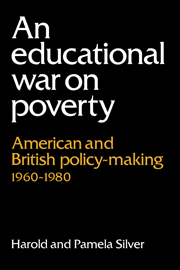Book contents
- Frontmatter
- Contents
- Acknowledgments
- List of abbreviations
- 1 Introduction: a proper complexity
- Part I A pattern of events: United States
- Part II A pattern of events: Britain
- 7 Advancing from poverty?
- 8 Opportunity, equality and social class
- 9 Sounds and silences
- 10 Plowden: direction finding
- 11 Plowden: making choices
- Part III Following through
- Interviews and consultation
- Bibliography
- Index
9 - Sounds and silences
Published online by Cambridge University Press: 03 October 2009
- Frontmatter
- Contents
- Acknowledgments
- List of abbreviations
- 1 Introduction: a proper complexity
- Part I A pattern of events: United States
- Part II A pattern of events: Britain
- 7 Advancing from poverty?
- 8 Opportunity, equality and social class
- 9 Sounds and silences
- 10 Plowden: direction finding
- 11 Plowden: making choices
- Part III Following through
- Interviews and consultation
- Bibliography
- Index
Summary
Primary education was effectively rediscovered in Britain in 1967. The American education programmes of the 1960s began to be discovered in Britain in 1967–9. In the latter case there was a time lag of almost a decade, but the concept of ‘time lag’ explains nothing. Some ideas travel fast. The educational content of the war on poverty, and of its antecedents might have been expected to do so. In the next chapter we shall focus on the Plowden committee, including its attitudes, vocal and non-vocal, to the American experience it investigated. Here we shall bypass Plowden and look at how the British saw the American developments in the period from 1964 to the early 1970s. 1964 is important in this context as the point at which American anti-poverty policies and programmes began to have weak echoes in British publications. The British press and specialist educational publications were virtually silent on the formative years of the Ford Foundation's and other initiatives of the early 1960s. Not until 1967 and after did the work of the Foundation, Martin Deutsch, Susan Gray, Frank Riessman or Head Start, for example, receive public mention. From 1964 to 1967 there was a trickle of public comment on the American policies, though mainly on the war on poverty in general, not on education specifically. Only from 1971 did the education policies and projects seriously become public property in Britain. The analysis has to be of silences as well as sounds.
It is important first to recognize the ‘private’ networks in which information did circulate – though probably even here to a severely restricted extent.
- Type
- Chapter
- Information
- An Educational War on PovertyAmerican and British Policy-making 1960–1980, pp. 187 - 209Publisher: Cambridge University PressPrint publication year: 1991



